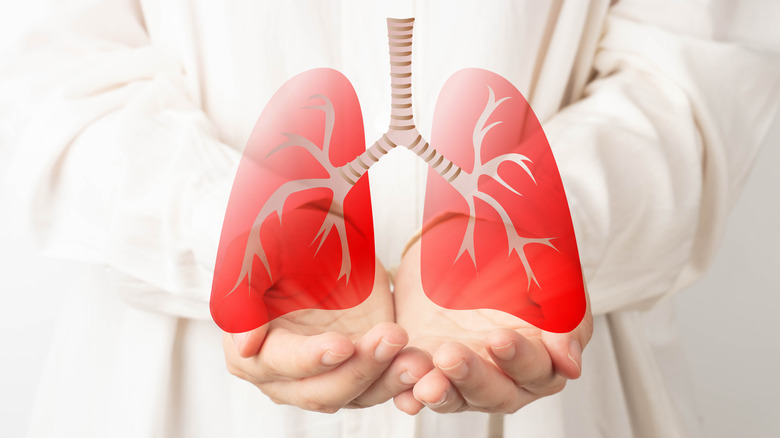Can You Get Lung Cancer If You've Never Smoked?
Lung cancer is a crisis worldwide. According to the Association of Community Cancer Centers (ACCC), lung cancer is the second most diagnosed cancer-related disease and is the number one cause of cancer-related deaths among people. In fact, lung cancer ended the life of almost 1.8 million people in 2020 globally. And while cigarette smoke is the main cause of lung cancer, non-smokers aren't completely immune to the disease (per the Cleveland Clinic).
Statistics from the Centers for Disease Control and Prevention (CDC) show that about 10% to 20% of lung cancer-related cases occur in people who've never picked up a single cigarette or those who've smoked less than 100 cigarettes in their entire life. This proves lung cancer can be just as dangerous in smokers as in non-smokers. Lung cancer in non-smokers is even considered one of the most deadly cancers in the United States, reveals the American Cancer Society.
The various factors that cause lung cancer among non-smokers are numerous, but why is that?
Possible causes of lung cancer in people who don't smoke
First, it's important to note that lung cancer in non-smokers is still less common than in those who smoke. In fact, it's linked to about 80% to 90% of lung cancer deaths, per the CDC. Nevertheless, cancer in non-smokers is still an issue and mainly stems from exposure to secondhand smoke (via Medical News Today). In a separate article, the CDC notes that even a brief exposure affects how the heart, blood, and vascular systems function. Cigarette smoke damages the lining of blood vessels, making blood platelets stickier.
The experts at Medical News Today also link exposure to a radioactive gas, known as radon, as another cause of lung cancer among non-smokers. Radon is described as an odorless, and colorless gas that enters buildings through the cracks and holes if smoked inside, according to the United States Environmental Protection Agency (EPA). Additionally, it is the second leading cause of death caused by lung cancer among non-smokers, claiming over 21,000 lives annually.
As for the symptoms of lung cancers, they're not so clear-cut (per Healthline). Smokers and non-smokers may experience vague symptoms, including chest or back pains, breathlessness, and coughing up blood in phlegm. However, more severe symptoms, like chronic fatigue and unexplained weight loss can start to show as lung cancer spreads. Other symptoms may include difficulty swallowing, swelling in the face or the neck due to inflammation, and frequent lung infections, such as pneumonia (via Yale Medicine).
Lung cancer prevention tips
Various lifestyle changes might help to reduce the risk of getting lung cancer. But before discussing them, it's worth noting that the disease can sometimes emerge due to no fault of your own. A 2017 study published in the journal Oncology Letters reveals that around 8% of lung cancers are inherited. However, it still might be possible to reduce your risk.
According to the American Cancer Society, the best way to reduce your risk of lung cancer is to avoid cigarette smoke and reduce exposure to hazardous chemicals in the workplace, home, school, etc. The CDC advises testing your home for signs of radon pollution.
As for lifestyle changes, Healthline recommends eating a balanced diet filled with vegetables, like Brussels sprout, cabbage, and cauliflower. Regarding exercise, experts don't fully know how exercise can reduce lung cancer risk. Likely factors include a reduction in carcinogens, inflammation, and improved lung function. In fact, a 2010 study reiterates this claim noting that women who exercised were 20% to 30% less likely to develop lung cancer. For men, the chances only got better from 20% to 50%, confirming the golden rule of regular exercise.



